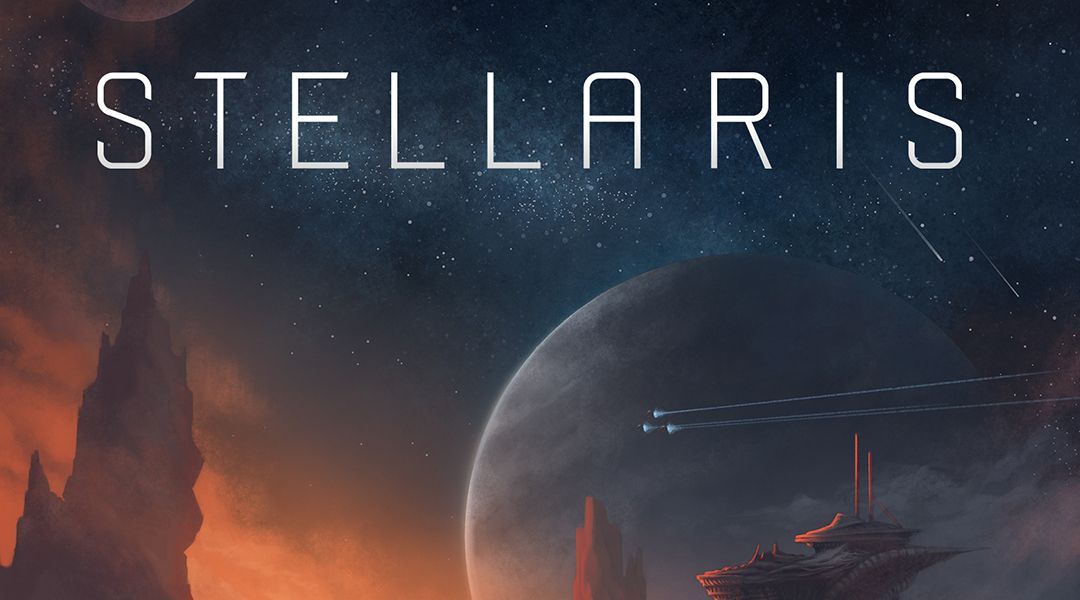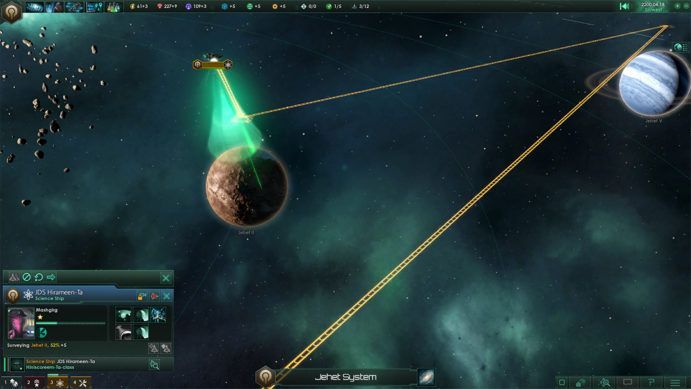
Stellaris Review
By Rob Gordon 26 May 2016
Stellaris combines watertight strategic gameplay with a wonderful sense of exploration to create a thrilling and engrossing spacefaring grand strategy title.
When it comes to grand strategy and 4X games, Paradox Development Studio is perhaps second to none. The developer has found tremendous success through the release of such stalwarts as Europa Universalis and Hearts of Iron, and is seen by many as the champion of the genre. That said, newcomers to the developer’s library may find themselves a little taken aback, and the games have often deserved their reputation for being a little opaque for fresh players.
That criticism, however, looks to have been addressed in the best possible way with Paradox’s new title, Stellaris. The game, which continues the developer’s long history with the grand strategy, crosses into new ground in a number of ways, including both with its spacefaring setting and its relaxed attitude towards new players. Indeed, Stellaris is perhaps the easiest Paradox-helmed project for newcomers to grasp.
Although the title is a little more determined in its attempts to acclimatize players to their surroundings, it’s done in a way that thankfully does not impede veterans of the genre in the slightest. If the player so chooses, they can dive straight in to Stellaris, warts and all, without any training wheels to help get a greater understanding of what is on offer. However, the game’s tutorial, which comes in the form of a fun AI companion and a set of objectives to complete, is extremely well handled, giving all the information required for new players without the need for kid gloves and without impeding on the player’s personal learning curve.

Indeed, the player may find themselves both following the tutorial aspects of the game and following their own natural path through the galaxy. It’s this level of flexibility that makes sure Stellaris is a treat for both new players and old, and will no doubt make sure that the game acts as a stepping off point for gamers looking to trial Paradox’s game style for years to come. Of course, it helps that the game, which is published by parent company Paradox Interactive, is full of content that gamers of all levels will no doubt enjoy.
From the off, the level of polish that Stellaris has is obvious for all. The player is given a choice of race to begin with, from two different factions of humanity through to avian creatures, sentient fungi, and aggressive reptiles. These species to not just differ biologically, either, as they all hold their own forms of government, racial traits that affect gameplay, and starting technologies, giving players a wide number of ways in which to play the game. The end goal? Domination of the galaxy, be it through conquest or through the growth of a peaceful civilization.

This may sound foreboding, but thankfully Paradox has designed the game to allow both a larger overview and more in-depth control over the minutiae. For starters, the player initially only has control over a single system – the Solar system of one of the human factions – which allows them to understand the basics of the gameplay without worrying about barbarians at the gates in the form of other races. Meanwhile, the game’s tutorial pop-ups prove to be extremely handy when trying to remember how specific parts of the game function.
Although, like many real-time strategy games, Stellaris is hardly a graphical powerhouse, the game still has plenty of surface level quality as well. The title’s galactic backdrops are very pleasant to look at, with plenty of subtle color akin to the galaxy maps of the Mass Effect series, while the variety of different planet types, mining colonies, and ships are all precise enough to see and comprehend, in spite of the large scale of the game. Meanwhile, Stellaris has a fantastic score that maintains the atmosphere of the game, with glorious, sci-fi movie-esque synth work and occasional dramatic overtones.

Perhaps the biggest success of the game, though, is the sense of exploration. In many strategy titles, although exploration is key to victory, the player very rarely feels like they are discovering something new. Indeed, with games such as the aforementioned Hearts of Iron or the historical games of the Creative Assembly-developed Total War franchise, the player will most likely know exactly what is due to come next – as long as they know their geography and history.
With Stellaris, however, this is thrown out of the window entirely. A galaxy is a large, large game map, and the player is going beyond current scientific knowledge and out deep into the unknown. Discovering new systems, and surveying them to check for habitable planets, vital resources, or intriguing anomalies is the most enjoyable part of Stellaris, while meetings with other intelligent life out in the cosmos provides its own impressive thrills.
It’s an absolute triumph, and Paradox deserves full credit for introducing such a strong atmosphere of pioneering to a genre that has traditionally felt fairly rigid. Stellaris manages to bring back a similar feeling to those found when exploring some of the classics of the strategy genre, such as running across another faction in Civilization. A sense of discovery has sometimes been thrown aside for improved strategic mechanics by other developers, but thankfully Paradox manages to combine the two into one slick package.
Aside from this exploration, Stellaris is also an interesting and challenging game to play. From resource management to empire progression, the title rarely stops throwing multiple gameplay facets at the player to control, and it takes a lot of concentration to stop from being overwhelmed by the sheer number of factors in play. Paradox has built the game to be a forgiving experience on the lower difficulty settings, though, so forgoing some of the various strands of gameplay will not cause the user to automatically struggle to get a foothold in the galaxy.

It’s not all perfect, however. Some additions feel like they cut away from the core of the game, such as elections for new Presidents of Earth for one of the human factions. Although these elections then give the player some extra jobs to do in order to fulfil the successful candidate’s mandate, it feels a little tacked on. That said, the sheer variety of different political structures in place across the various species, from military dictatorships through to monarchies, more than makes up for any quibbles over individual government types.
In the end, then Stellaris is a tremendous return to form from Paradox. The title manages to mix complex strategy mechanics with a more lenient attitude towards newcomers to great success, granting a level of flexibility of play rarely seen in the genre. Combined with some great world-building and an enchanting atmosphere, Stellaris comes highly recommended.
Trailer
Stellaris is out now for PC, Mac, and Linux. Game Rant was provided with a PC code for the purposes of this review.
